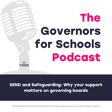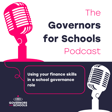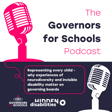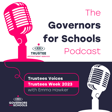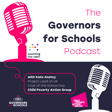Become a Creator today!Start creating today - Share your story with the world!
Start for free
00:00:00
00:00:01

Empowering inclusion - how school governors can work with schools to create an inclusive culture
In this episode we are joined by Leyla Gambell, experienced SENco and writer for the Times Literary Supplement, and Susannah Butcher, retired headteacher and Chair of Governors, with a responsibility for SEND. The pair discuss how they've encouraged inclusivity in their school through the 'Inclusion Action Team' - working together to engage pupil voice, ask the right questions and communicate with their community.
Find out more about the Inclusive Governance campaign: https://bit.ly/4891I9a
Find out more about the role of a school governor: https://bit.ly/3GwUY8U
---
Music by: Bensound.com/free-music-for-videos
License code: GGXDEC3OBQEGW4XO
Transcript
Introductions and Inclusive Governance Campaign
00:00:02
Speaker
Hello, I'm Emma Hawker, Impact and Projects Manager at Governors for Schools, and I'm here with Leyla Gamble and Susannah Butcher to talk about how school governors can create an inclusive culture in their schools. This conversation forms part of our Inclusive Governance Campaign, an initiative that encourages a wider pool of volunteers to take up the all-important governing roles and help champion inclusivity in schools. Our inclusive governance campaign has been sponsored by Governor Hub and we'd like to extend our thanks to them for their support with this important topic.
Guests' Backgrounds and Experience in Inclusivity
00:00:36
Speaker
So without further ado, please could you both tell us a bit about yourselves?
00:00:41
Speaker
um So I'm Layla and my background is in teaching originally. I've been a teacher for four years than I care to remember, but in more recent years I've taken a role in SEND. So I've been a primary SEND co for six years and I've recently moved roles into a secondary SEND. So my interest sort of spans across the sectors really and I'm very passionate about special educational needs. I also um write for Times Educational Supplement which is where governors for schools originally saw an article that I wrote on inclusivity in primary school which has sort of brought us here today and um I've also got Susannah with me. I stopped, well I didn't start, I stopped at office banker back in the day um but I have worked as a TA
00:01:24
Speaker
at schools mainly in reception class for 17 years but retired seven years ago but I've also been the governor at the school for an awfully long time and three years ago became chair of governors and I have responsibility for send and well-being in the school so have worked quite closely with Layla whilst she was at the school. Learning and encouraging and enabling and being very enthusiastic about all the inclusive measures that she's been introducing. Brilliant, thank you very much. So to
Efforts and Importance of Supporting SEND Initiatives
00:02:01
Speaker
start things off I thought it might be really helpful to get your take on what you think governors can do
00:02:06
Speaker
to try and help foster a culture of inclusivity thought? Well, I think i think certainly in in the school that we were at, I obviously met very regularly with Leila over and discussed what was happening in the school with SEND. But as soon as there was a sort of at-her-her inclusivity group, obviously loved going to their meetings. loved encouraging all their ideas, loved just speaking to them, which kind of just widened the the ah scope of what the governors understood because I could then report back to the governing board about what they were doing and they would also get enthusiastic about all the activities that were happening. They could see the positive results of them so well but with the children.
00:02:50
Speaker
which was just wonderful to see. but from ah From my point of view I always felt really supported by Susanna. I knew that um she attended relevant training courses to do the send because she'd come and tell me about them and when we met regularly it was always in a spirit of cooperation and support although she asked relevant questions and sort of probed to sort of dig dig a bit deeper into how House End was going when we met. It it was always in in that kind of cooperative spirit and I felt really well supported. I think that Susannah coming along to the Inclusion Action Team meetings made a real difference not only obviously as as she said in in her understanding of what that group was achieving but also for the for the children as well because it meant that they they they knew who their Chair of Governors was and they had a better understanding of her role in the school.
00:03:42
Speaker
but also they could see that she was interested in them and they could see that she was interested in what what we were trying to achieve. And to be honest,
Student and Pupil Voices: Engagement and Feedback
00:03:50
Speaker
a bit like today, she was always just going to bowl in and help out with whatever I asked her to do, which was always extremely helpful and very valued. But that sounds really great and I think that's so important to kind of have that support and that open communication. And as you say, being able to provide that that kind of challenge, but in a supportive way. yeah kind of Everyone is always working for the same outcomes together. Brilliant. I wonder if you've got any thoughts this is had particularly on capturing that people voice and making sure that we really
00:04:22
Speaker
including pupils and hearing from them and and and getting their experience. yeah that's always That's always an interesting thing to do and in fact I actually once at one of our meetings said to Leila, is there anything that I can actually do to help? And Leila said, well actually yes, you can catch some pupil boys. So I did come in and and sit with some of her send pupils and we went through, well we had lots lots of lovely conversations, I mean about all sorts of random things as you can imagine, but I did manage to capture using little cue cards, how they were feeling, and yeah it was it was useful, I think it was useful for me, I don't know whether hopefully it was useful for Layla, but she definitely found out
00:05:05
Speaker
what some of the children were thinking and I think it's sometimes better coming from a person who they don't see every single day of the week coming from somebody else. They know who I am so I'm not a es strange person but well perhaps I am but not an unusual person to come into school but it was somebody a little bit different so perhaps you've got this I don't know whether it's more accurate hopefully an accurate picture of how they were feeling That's what we were hoping for and I think it did really help that Susannah did that because at the time I was really mindful. I did, I'd done some, I can't remember when it over was, it was a, yeah, perhaps just before we set up the Inclusion Action team. I was really mindful that when I carried out people voice with pupils
00:05:47
Speaker
because I already had a good relationship with them quite often. I would ask them questions like, are you happy at school? Do you feel safe at school? And I would always kind of feel that perhaps they were answering in a way that they wanted to please me and to give me the right answers. And I was really mindful that actually what I wanted was, you know, them to feel confident, to to give their voice. and So Susannah was kind of ah a useful neutral party, if you like, in that they recognised her. but She wasn't one of their daily people, so the aim was that they could give her kind of hopefully and on and an honest answer. are not that you know Not that obviously, you know, I was concerned that they obviously weren't happy at school, but I think it it was really helpful in having somebody from a little bit outside coming in and just having a bit of a different perspective with them, and that was helpful.
00:06:34
Speaker
I think
Board and Practical Support for Inclusivity
00:06:35
Speaker
that that kind of discussion about how to collect pupil voice part of what then led on to the the group being set up because it is it is difficult together to gather and send people voice. Oh, fantastic. Thank you. Could you tell us a bit more about the group? Yeah, so um it was it was sort of born out of a number of of conversations, really, about how to accurately hear from our sent pupils, but also how to provide some kind of space where they could perhaps um meet together because I was really mindful that when I was talking in isolation with send pupils actually common themes arose that I was aware that they could potentially be supporting each other with and and it was it was a kind of we had we had several conversations on how to facilitate that because what I didn't want was to provide a group
00:07:30
Speaker
where we were saying, oh you've got send and you've got send, let's you know put you together and you know see see if you guys can get on. I wanted it to be broader than that. So in the end, we probably devised a group that I introduced to each class in the school um and I went around each class and I talked to them through. yeahre part of a We were already you know obviously quite and already familiar with language of neurodivergent and sort specific needs. so that that that but piece of work had already been done and it was ongoing and so I explained to them that you know to continue with that I was producing this group and I was looking for young people, peoples who were either neurodivergent had neurodivergent siblings or parents or family members or who were just interested in neurodivergence and that anybody was was sort of welcome to come along and
00:08:23
Speaker
staff then kind of selected a few pupils because obviously we couldn't couldn't take everybody and they taught they kind of tried to identify sort of some key pupils but but to get a bit of a mix as well and we ended up with about 15 from across the school of which there was a broad sort of spectrum of um some young people who had send, some who had siblings with send and and a couple that that just had a particular interest So it was a really interesting mix and that's kind of where we started. And they actually really supported each other really well when they're in the group together. The group dynamics work incredibly well so it was a good selection, a good team. That must have been really great to see all of that come together and kind of the impact on those pupils. Was there anything that the board was able to do that supported with that? I know you talked a little bit about coming along to those meetings and
00:09:19
Speaker
kind of communicating with those pupils a bit, Susanne, but was was there anything else as a board that you did to to help facilitate one of that? I'm not sure that we actually did anything very much more practical. We did provide, one of their one of their ideas was to have fidget toys for the whole school, which um which is something that they wanted to to introduce and it was something that was reasonably easy to do, so the governors did actually cough up and and provide some fidget toys. So that was our practical sort of thing to do. We also were very much aware when Leila left and we had to recruit a new Senco and they were involved in the process. I think the rest of the governors were just amazed and so pleased to hear that actually their voice was heard.
00:10:16
Speaker
and And I
Strategies and Observations of Inclusive Practices
00:10:17
Speaker
was actually in on that um interview, so all the various interviews and the discussion afterwards. And they were so insightful, these children. It was just amazing. So to be able to report back to the board that their input in something like that is fantastic. So, yeah, um as I say, I'm not sure we did anything more practical apart from sort of just go on on to meetings. I did provide one of the adults because they they also had some, um they wanted to speak to grownups who were neurodiverse, which was a wonderful thing for them to be able to do to see that there is kind of life after school and um and what but people with their sort of different brains to do actually do for a living. um So I did provide my son for that. So that was handy. That was a practical bit of help.
00:11:12
Speaker
what What a fantastic thing to do and to help those children feel really inspired and motivated and a look at those long-term plans. How exciting. I really love that. That's great. That sounds really, really positive. And I guess it must have felt quite empowering for those people's as well to feel like you're really listening to the things that you said. Oh I think it did because as I say they they were just amazing at at sort of the question I mean obviously they had thought about their questions beforehand it wasn't just off the cuff but their questioning of of of potential um sends sort of thing was but wonderful and and their ability to
00:11:54
Speaker
speak about the responses that they heard. Fantastic. Really, really insightful. I really like that idea. I think that's absolutely so valuable and such an important part of that process. So perhaps to any other governors who are kind of going through that process at the school level, that's such a nice idea to say, you know, can we make sure that we're including this this people voice in that process. Brilliant. Thinking about working with pupils and going into school and things. What kind of things do you think um you might see in an inclusive school? So if governors are going on school visits and things, what might help them get a sense of what the inclusivity is like in the school requirement? I think if you if you go into a classroom um and
00:12:42
Speaker
if you you you are very often aware of the children that um struggle with various things in the in the classroom um and you can you can tell the way the teachers or the TAs relate to them that that that there is some support there that is particular for each child and it may be ah you know a separate laptop or something as a obvious as that. It may just be where they're sitting in the class so that they are given the support that they need and can see and can hear and aren't distracted by the rest of the shenanigans that go on in the classroom.
00:13:25
Speaker
um So I think you can really tell in a class that if you've got a teacher that is aware of the needs of each of their children you can really tell that what's what's happening in the in the classroom and and a governor can watch that happening and actually it's a really interesting thing to do when you go into a classroom is to watch how how the support is given in just really very small ways sometimes. It doesn't have to be major, it doesn't you don't have to be sitting with a child all the time holding their hands, it's just sort of checking in and and making sure that they're kind of on track and are okay with what's going on and and if they need five minutes they can have their five minutes and yeah.
00:14:14
Speaker
they need a wobble cushion, they can have their wobble cushion or just little things like that that really help them and focus on what's, what's being taught. I think it it goes back to that wider ethos as well. And that was, you know, what we were sort of really looking to build. And that's, you know, exactly mirrors what, what Susannah was saying was that, you know, actually within the classes as well, the sort of whole school model, of inclusivity, where staff um were aware of the child's needs, were aware of what broader needs looked like, and were aware of ah common and agreed strategies to support children. So, for example, we use zones of regulation as a whole school, emotional regulation tool, so that, you know, when class transitions happened, actually, you know, it was it was quite straightforward because teachers, mid-ML supervisors, um people use the same language
00:15:11
Speaker
um whether they were in in their normal class, whether they'd moved class, whether they were on the playground and that there was that wider understanding of behaviour being a communication um and what what is that young person or people trying to say to us as opposed to, you know, actually that that child is is not behaving. Okay, well they're not behaving, but what what is the what is the need and what what do what do they need from us? And I think that that's a really important thing to try and build in ah in an inclusive school.
00:15:44
Speaker
um and and yeah certainly certainly where we were going. We also asked the children that was the first thing I did um when we set the group up I got them to draw me a picture of what an inclusive school looked like then we talked about what inclusion meant um and how how how that might be represented and they you know they they came up with their own ideas which we then worked on and obviously the tuck shop although You know, it was quite an interesting one, but that's, you know, we did, we did work on that cause they, they said, well, we think inclusion means everybody should be able to have a snack at break time. And they said, sometimes people come in and they, they haven't got a snack and that that upsets us or worries us. Or that was, that was something as a group they came up with. And we, we worked on that and we, we developed the Tupper shop.
Budgeting and Holistic Inclusivity
00:16:22
Speaker
So I think that listening to what the children think and building on that is, is, is also important. The budget bench as well, your budget bench. It was another one of their,
00:16:34
Speaker
ideas yes play times and break times were a clear focus that they had obviously because that's you know that's that's an important part of being a child um and that was their kind of steer really And I think that's really where, as governors, this coming year, we're going to have to agree some expenditure um to develop our playgrounds and our field to make those playtimes and lunchtimes better for the children. So that that's something ah that's an action as a the governor is is getting your budgeting correct. And especially in times where budgets aren't exactly huge at the moment um and it's tough but it's an area that really needs to be developed in our school and so we just need to make sure that it's high on the priority of spending um so that that we give the children every opportunity they can to have a great playtime and a great lunchtime instead of a traumatic one.
00:17:39
Speaker
I think that is such an important point actually, especially like you say as budgets are really being squeezed in and perhaps for any governors who aren't necessarily thinking about that holistic school experience, it's not just what's happening in the classroom, break time to play time, such an important part of what will impact those young people. I think that's a a really important point there and I think we're absolutely right, we'd really like to see governors remembering all of those, those kind of things. And it's, you know, so many different parts of the children's school day.
00:18:14
Speaker
Fantastic. Thinking about the the vision and the ethos and what we were talking about then in terms of the school, what do you think governors can do in terms of setting that, that kind of vision for the school, setting that strategic direction, but make sure that interclusivity is a really key part of that? Well, we're, we're at, um, Church of England Aided School so we have a Christian vision and Christian values and our Christian vision is um from John as Jesus as the vine and I just think that that is just an ideal vision to include everybody within the community and the support the vine as the support um and enabling everybody to grow
00:19:00
Speaker
and flourish and bear fruit. um And I think that is just such a good vision for an inclusive school because it does include everybody. It does support everybody and it enables everybody to just be the best they possibly can. but That does sound like a really lovely inclusive vision for everyone. I'm thinking about including um everybody. Have you got any thoughts about how the governing body can make sure that things like communication are really inclusive of all stakeholders? So not just that the children and young people, but families, parents, how we can make sure that things that are coming from within the school and and being communicated outwards are inclusive of everyone in that wider community.
00:19:51
Speaker
For Susannah, what I will say is I ran some um pair around parent groups, termly, and Susannah would come along to those whenever she could. um And so we were actively at that time trying to encourage parent voice and also to encourage a safe space for the centre parents to come along to, although again, like the people group, it was open to all parents, it wasn't a particularly targeted group. We we did encourage um anybody to come along. Susannah did um come along to as many of those as she could and bought cakes. Absolutely. um And came and and supported.
00:20:26
Speaker
and you know obviously was able to articulate from from the governor's perspective although generally was just there as an adult to contribute and who was interested did in in what was going on but then as a governor um could could then you know hear what the parents were saying and kind of take that take that away really and I was really grateful that she was able to come along to those and that I found that really helpful I think communication in a school is ah is always a is always a difficult thing. There's always somebody who says that they didn't know that or and but however hard you try, I just don't think you ever get everybody to hear everything. And I do think we we really do try quite hard with all our various means of communication. The governors do try and come into school and
00:21:20
Speaker
um or a parent's evenings there. So if anybody wants to have a chat, then we're there. um We do also run the parent voice, and the collection of the parent voice every year at a parent's evening so that we try to persuade parents to to fill in their questionnaire. um We try to go to sort of church services as well which is always a really good time to talk to parents so that they so they can talk to us. it's it's This sort of whole communication and how you relate to
00:21:55
Speaker
or our stakeholders is something that we're really thinking about at the moment because it's such an important part of our job. I think they're talking that that relationship with stakeholders is one of our is the fourth core function of the governing body at the moment. um And so it's something that we're really focusing on um over the next couple of months as a governing body and really realising how we do relate to children, parents, the local authority, um you know the church, because obviously they play a very big part in our school. um
Inclusive Communication and Stakeholder Engagement
00:22:35
Speaker
So and it it is amazing the number of different ways that we
00:22:39
Speaker
do either communicate or are involved in in various things. um And as I say, I think it's just a case of governors just being being in ah at as many things as you possibly can go to your all the friends of the school's events if you possibly can support them. support the things we get at church. I love a school trip. We do go on a lot of school trips, go to the concerts, go to, you know, um go to the the nativities. And ah again, that's an an excellent time to actually speak to parents and get their view about not only that wonderful nativity that they've just seen, but, you know, other things that they think about the school or or things that they want to say just to get it off their chest, really.
00:23:27
Speaker
But yeah, it's really key, really difficult. I think you're absolutely right there. I think sometimes if if there are governors listening who are kind of thinking school visits are about going in and walking around classrooms and making notes, there are so many other ways to engage in school life, like you said, being present at different events and things. And it sounds really positive that the governors ah make such an effort to be really present and really visible to members of the school community. That sounds great. And I think another really important point as well, and about always thinking about how you can reflect on that communication, that inclusivity, because actually it's not a tick box exercise and going, well, we've done this, this and this for inclusion. So now we can just just stop. And it's always about kind of continuing to do that. Is there anything that you
00:24:21
Speaker
think perhaps works particularly well in terms of making the staff feel like it's a very inclusive environment and the other governors on the board feeling that the board is is kind of open and inclusive to governors.
00:24:36
Speaker
um I hope that we are inclusive as a board. I do think we we have an interesting mix of people. We obviously are struggling, like most boards at the moment, to actually recruit governors, which is an ongoing problem, which I can sort of understand. um But I mean, we do try and sort of be as flexible as possible with meetings and and how we run our meetings and and actually we're fairly laid back so that nobody gets too twitchy about being scared about them. We always have food and biscuits and coffee and things to make it more well not more of a social event ah it's ah obviously a business event but more more friendly I think really to so that everybody feels able to speak
00:25:31
Speaker
um ah I certainly don't think that any of the governors are frightened of speaking at a meeting. with We have quite
Challenges and Achievements in Inclusivity
00:25:38
Speaker
robust conversations, so I think it's working in to a certain extent. If people people have had issues in the past and i you know have come to me for me to then speak to other individuals and we've sorted those matters out, and I think as long as you can have conversations with your board, but I think it's usually solvable.
00:26:09
Speaker
I think youre you're absolutely right. Building those relationships and having those dynamics where people feel that they can be open and honest and have conversations and ask questions and that there's no judgment or anything. I think that's a really great way to make people feel like they can contribute and participate. The other thing I wanted to ask you about was what kind of questions do you think governors should be asking perhaps of themselves in terms of reflection or asking school leaders around inclusion?
00:26:44
Speaker
I suppose to make sure that, you know, as Susannah has done, whether they've you know got got a clear understanding and then have completed development training so that they can fully understand what you know good good practice in send looks like and what um a good model of an inclusive ethos is in order to be able to have those I think you know like that robust conversation yeah zanna yeah absolutely no I do I do agree I think
00:27:15
Speaker
training is really important and there is a lot of training ah available to be fair so I think ah think that is really quite important. You do have to brace yourself to have the conversations sometimes which is not always easy but you just have got to have them on occasion. I think you just have to be really enthusiastic as well and you know if somebody's got an idea you've really got to make sure that you're kind of behind them and or with them and and going with it and looking to see how the children react and how the staff react and
00:27:58
Speaker
to make sure that that that things do carry on moving forward and and evolving and new ideas are, you know, tried, some may be successful, some less so, but just give it a go. um Anything that makes the children feel happier, more relaxed, and so they can learn better.
00:28:26
Speaker
I think that that sounds really positive, that's fantastic, thank you. I'm going to ask you a bit of a tricky one now. everyone spot lift coat what Can you tell me about one of the things you're most proud of having done in your work with the school? i'm sure I'm sure I think there's probably lots and lots of things that sound amazing from the bits that we've heard. So I know it's a bit of a tricky one, but I would love to hear about one of those things or especially proud of. I mean, it you know, for me, it was i'm moving from what had started off as an idea for gaining pupil voice to what was effectively by the end, a support group that was re-engaging, you know, disengaged and vulnerable pupils back into
Positive Impacts of Inclusivity on Pupils
00:29:12
Speaker
school life. And, you know, that that remains one of the things I'm most proud of.
00:29:18
Speaker
because it you know kind of surpassed all of my expectations with ah with the you know pupils, with their you know with their vision, with their ideas, with what they wanted to achieve and that the clarity of their ideas as well. So it was the, you know like Susannah mentioned, the reason why we ended up with with her son coming in and why one of the pupils' parents came in, who who was autistic himself, was because the children said, well you know, we'd really like to know what it's like to be a neurodivergent adult. And, you know, to be honest, is that hadn't occurred to me to actually build that into the into this wider school life. um And that was that was their their idea. And we, you know, obviously we then enabled enabled that um and they they you know got some really, it was it was it was some really lovely sessions that we had. And I think I think i am really proud of that because it yeah opened opened doors and
00:30:14
Speaker
i'm offered so much value, I think, to as well as as well as being able to hear their voices really clearly. It gave each other that themselves as well so much support and that was that was really lovely. Yeah and and they because the Inclusion Action Group were also involved in um a deep dive that our school improvement partner um came to do. um and they were just brilliant that you just sat with them and you were just so proud of these children who are confident and able to express sensible opinions to a complete stranger. um And yeah, what i I was so proud of them, especially at that point, they they did an amazing job. And I think that's just because they've been given the confidence that
00:31:13
Speaker
being neurodiverse is not a bad thing. I think the latest group has really turned kind of negative connotations into positive kind of connotations and there's it's never a negative thing. It's always positive. She always turns it round to look at what's good about being neurodiverse. I mean, it's not something that you need to be ashamed of and you know try and be normal. You just have to look at the positive side of it. And I think that's been a brilliant part of that group is that it's turned into something really seriously positive um from their perspective, but also from other children's perspectives. They don't
00:31:58
Speaker
They think you know that they're impressed by what what the group does.
Reflections and Advice on Being Inclusive Governors
00:32:03
Speaker
And so are the staff and the governors. They have just done so brilliantly. it's It's amazing. It does sound really incredible. And this is one of the reasons I love conversations like this, because it's inspired me to go back to my own board then and to ask some questions about what we're doing to make sure that you know we can make sure our pupils feel important and that they have value and and to feel really positive in that way. So it's really nice to to kind of learn about one of that fantastic. But the last thing I'd just like to ask you is what would you say to anyone who is really passionate about making schools an inclusive place and is thinking about whether they could do that through governance? What you might say to an anyone who's thinking about becoming a school governor to support inclusivity?
00:32:54
Speaker
I think Suzanne has already mentioned enthusiasm and I've always felt that from from her in the governing body at the the school. I think that you know that willingness to get involved um and to to see the children grow and grow in confidence and support that wider ethos of positivity, um ah you know I think he is is a wonderful contribution to make. um and you know is is not know i enthusiasm isn't yous it's not difficult thing to bring, I don't think. um but would be No, I totally agree. As I say, training I think is really key because you do need to know sort of vaguely what you're talking about, really. And as I say, that that is key. And as long as you've got that and some enthusiasm, seriously, um um I was really lucky because we got
00:33:50
Speaker
got brilliance in current school, so that was fantastic. It was also very enthusiastic and had lots of good ideas. um And I think the rest of the staff also did, to be fair. You managed to get the rest of the staff very on board with this whole sort of idea, didn't you, which was lovely. they they It really is a sort of excellent staff team kind of working together. It is very much a team effort. um And I think, and also with Leila being I think it's really important that Senko is on the senior leadership team because then she has input into sort of things like curriculum and the school development plan and that kind of those sorts of things are really important to make sure that the inclusivity is
00:34:38
Speaker
is there right at the beginning when plans um are made and and curriculums are discussed. veling thread yeah So i think I think that's a really useful thing to have your sink along the side.
00:34:56
Speaker
Yeah, that's to say I think being the SEND governor I think is amazing. it's It is one of the best ones like I have to say and it may be that I have to give it up soon but I should miss that very much because these children I just think are just so wonderful. We have an annual talent show at school, which happened at the end of last term, and there were several of us send pupils taking part in the talent show. um And I'm just always amazed, well, A, it's difficult to stand up in front of the whole school and and judges and perform anyway, so I'm always impressed by anybody who can do that. But the fact that we send children got up and
00:35:44
Speaker
did so well is just wonderful to say and it just makes me so proud it's one of those kind of wow moments really that make the hair to the back of my neck stand up and I think oh gosh that's so wonderful to see yeah that's that's been special. I think that's so yeah lovely anyone who who is really thinking about and being a school governor and then kind of helping to champion inclusivity. ah After hearing that, and what a lovely you kind of, I don't know, inspiring sort of, be really nice to kind of see people getting involved in governance. Because that sounds great. It sounds like such lovely, positive, important work having such a great impact on those peoples. So that must be really, really wonderful. So thank you so much both for your your time and your insight. It's been really lovely to talk to you. I'm feeling very
00:36:36
Speaker
I'm going to go back to my own school, my own board and then ask some questions and reflect a little bit on the way that we do things, which is one of my favourite things about talking to to other governors because it's always nice to learn. But thank you both so much for your time. It's been amazing. ah you're very Thank you very much. Thank you for having us.

